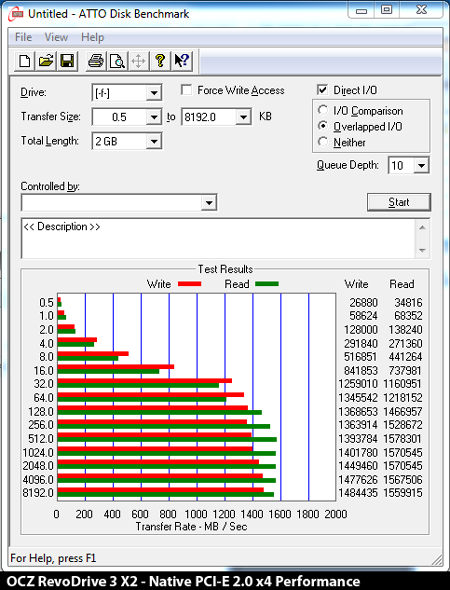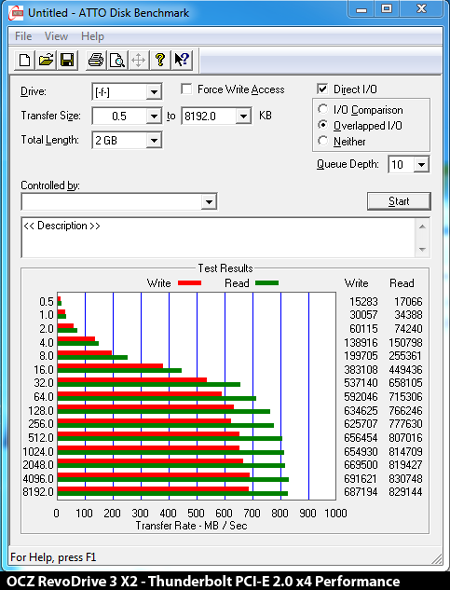Echo Express Pro: Desktop Graphics In A Thunderbolt Chassis
Taxing Thunderbolt With PCIe-Based Solid-State Storage
In theory, Thunderbolt's 10 Gb/s of bidirectional throughput should be good for up to 1 GB/s in each direction. We've seen performance levels that high in real-world testing, too. That's great news for anyone considering an Echo Express to add FC or RAID support to a host with limited expansion (like a notebook). There are a few caveats about performance, though. The interface's added latency does tend to cut into peak transfer rates, as evidenced below.
For example, the PCIe-based RevoDrive 3 X2, which we previewed in The OCZ RevoDrive 3 X2 Preview: Second-Gen SandForce Goes PCIe, should be capable of pushing more than 1 GB/s, or the limit of its four-lane interface, in sequential read and write testing. What happens when we drop the card into Sonnet Technologies' Echo Express Pro?
Sequential throughput tops out around 820 MB/s. That's still amazing, of course, but it also illustrates how the external interface handicaps hardware capable of taxing its upper limits. If you have the option to drop your add-in card to a motherboard's slot, do that. Enabling it through an external enclosure may compromise some performance. Though, if you're getting this sort of storage performance from an Echo Express Pro hooked up to your laptop, you're almost assuredly not complaining.
Get Tom's Hardware's best news and in-depth reviews, straight to your inbox.
Current page: Taxing Thunderbolt With PCIe-Based Solid-State Storage
Prev Page The Beauty Of Standards: Just Plug It In Next Page External Graphics Performance: GPU Compute-
amuffin Well, getting a laptop that supports thunderbolt is already pretty expensive. Then, you have to get one of these which ranges from $400-$800. THEN you have to buy a dedicated card....Reply
It's pretty expensive once you add it all up :/ -
yobobjm I like it, but I see limited use for it, especially for those of us who already have large towers, and don't really want another small tower added on to that. That being said, this would make a pretty awesome home dock for a laptop, and good for those tiny desktops that intel, apple, asrock, zotac and many others make (once all of those get thunderbolt).Reply -
acku Prices will go down. Remember that.Reply
Second, it's about the cost you'd have to pay anyways for a desktop (which you need if you want to game since you can't on a vanilla ultrabook), so its more like an alternative solution for those who want a single system setup.
Cheers,
Andrew Ku
Tom's Hardware -
mayankleoboy1 any controller + the surrounding ecosystem that is this expensive cant survive much. Not being a hater, but being a realist.Reply -
acku You don't know that :). USB 3.0 was expensive when it first came out. Look at things now. Wow things have changed. Prices are substantially lower now.Reply -
Vorador2 Needs to be cheaper. That's my only serious gripe.Reply
And well, for this purpose Thunderbolt still needs to be faster to fully take advantage of the external GPU, best around 16 Gb/s since it's the speed of a 16x PCIE 3.0 slot.
Although you could potentially sidestep this issue if you use two linked thunderbolt interfaces, but then there's the problem of synchronizing data transfers (and finding a laptop with two thunderbolt interfaces...if there's any) -
Menigmand If they can make this much cheaper, I would be very interested. I prefer to game on a laptop so I can easily stow it away when I have guests over and need the dining table. An extra box would be ok, as long as it doesn't need an external display.Reply -
assasin32 Well this makes things more interesting, when the price goes down and becomes resonable within probably the next few years it may give us the ability to buy laptops and attach some reasonble GPU's to them so we can play games on them a lot better.Reply
If this was around 8 years ago I would have been all over it and had it for my laptop since I used to use that for gaming.

